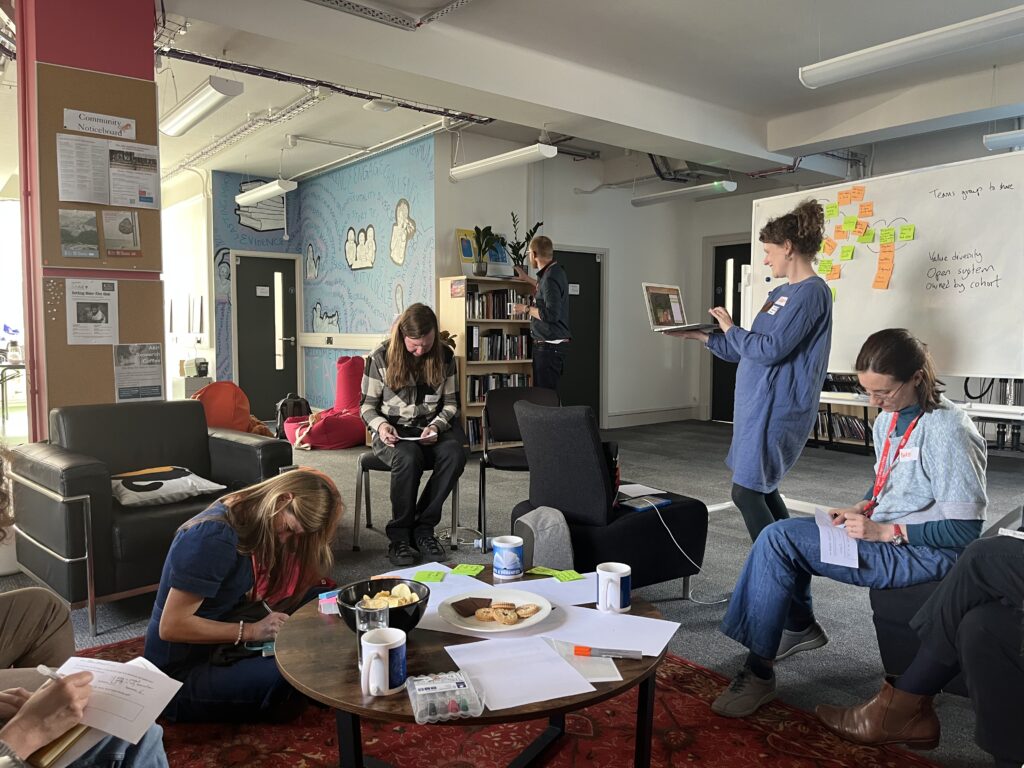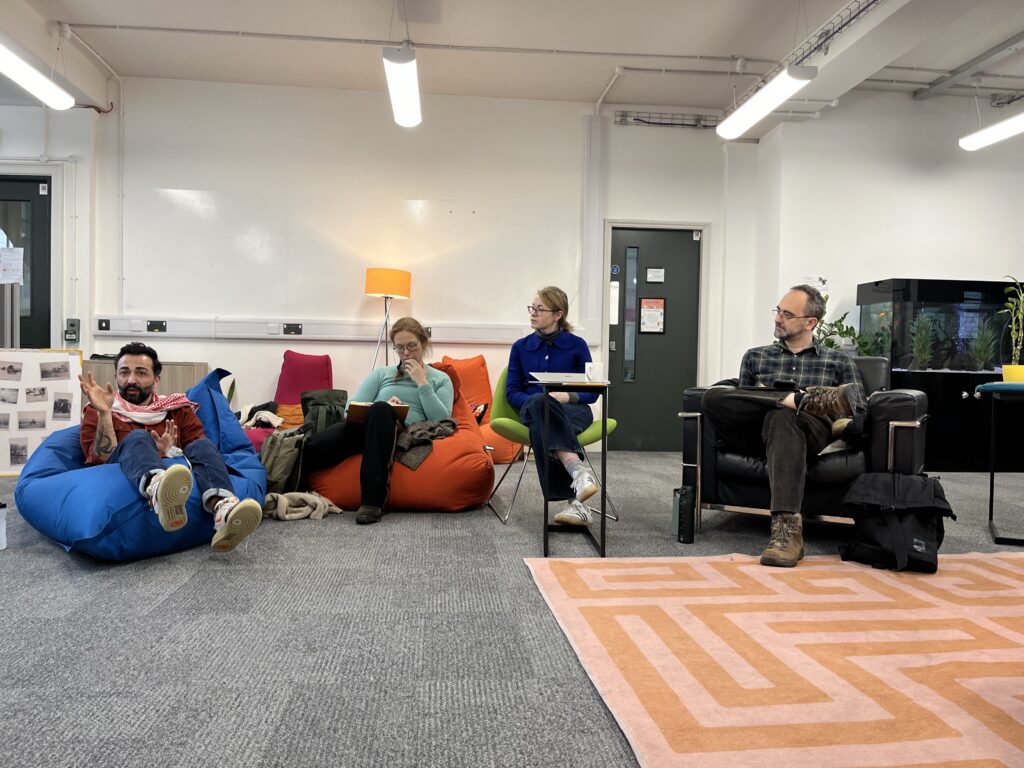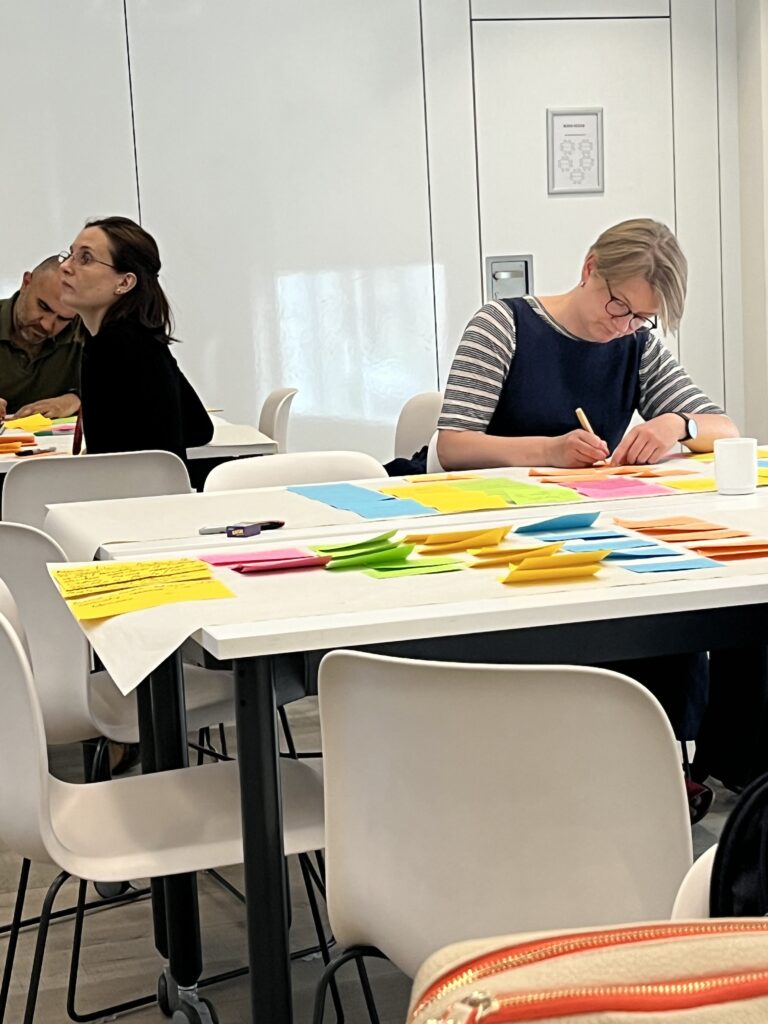Impact Fellows’ Programme

Background
Launched in 2023, the Faculty of Arts & Humanities’ Impact Fellows’ programme has supported 27 researchers across three cohorts to develop and think through the impact of their research with intensive expert support including funds for seminar / marking buy-out.
Led by Dr Lesley Paterson of MESH Associates and Susanne Buck of Flow Associates, fellows have been supported to generate impact and evidence collection plans with relation their research and in the process, developing a supportive, interdisciplinary network of others interested in impact.
Through taking part in the programme, fellows:
- Think critically about their own impact practice.
- Develop impact plans linked to their own existing / planned research projects.
- Learn about all forms of impact, enhancing their impact literacy, knowledge and understanding, including evidencing impact.
- Identify enablers and barriers to achieving impact.
- Become part of a supportive cohort, with shared aims, learning and problem solving.
- Support and celebrate their impact.
- Support departmental colleagues to understand the value of being impact focused.

Fellowship structure
The fellowship is delivered through two distinct strands:
1. Core Fellowship support activities (April to June)
Following introductory, online 1-1s between each fellow and Lesley & Susanne, a face-to-face session takes place for the cohort to meet one another, to discuss plans and to explore and share motivations and challenges with regards impact. This is followed by four sessions exploring the breadth and diversity of impact. Each session includes opportunities for discussion, reflecting on how the content fits with roles and understanding, and facilitates the development of impact and evidence collection plans. Sessions provide a mix of face-to-face and online delivery and cover the following topics:
- Understanding & framing impact [impact definitions, flavours & frameworks] – 1.5hr session delivered online.
- Pathways to impact [who, how, why, when] – 1.5hr session delivered online.
- Planning & mapping your impact projects [articulating and mapping your inputs, outputs & outcomes] – 3hr session delivered face-to-face.
- Counting what counts: Evidencing impact – 3hr session delivered face-to-face.
2. Responsive Fellowship support activities (October to December)
These support activities are developed and designed in response to a needs analysis and ongoing discussions with fellows. Activities could include one or more of the following:
- Opportunities to reflect upon / critique impact thinking, work and plans.
- Opportunities to explore REF impact case studies.
- Action learning sets (structured formats for resolving impact issues / challenges as a group).
- Any other impact-related topic that the cohort wishes to explore.
Each Fellow also receives two 1-1 coaching sessions with Lesley & Susanne, benefiting from tailored advice and support based on their own specific impact work. The Fellowship concludes with a reflection and celebration event.
Fellows
The 2023 cohort comprised:
- Professor Ellen Adams (Classics)
- Dr Aqeel Abdulla (Culture, Media & Creative Industries)
- Professor Sarah Bowden (Languages, Literatures and Cultures)
- Dr Tamsyn Dent (Culture, Media & Creative Industries)
- Dr Hannah Murphy (History)
- Dr Barbara McGillivray (Digital Humanities)
- Dr Iain Smith (Film Studies)
The 2024 cohort comprised:
- Dr Chris Manias (History)
- Dr Reza Zia-Ebrahimi (History)
- Dr Martina Zimmermann (English)
- Professor Fay Bound Alberti (History)
- Dr Daniel Mandu Thomaz (Languages, Literatures and Cultures)
- Professor Elselijn Kingma (Philosophy)
- Dr Jamie Hakim (Culture, Media & Creative Industries)
- Dr Karen Brien O’Kop (Theology & Religious Studies)
- Dr Lindsay Allen (Classics)
- Dr Munira Cheema (Culture, Media & Creative Industries)
The 2025 cohort comprised:
- Professor Ruvani Ranasinha (English)
- Dr Elisa Sampson Vera Tudela (Languages, Literatures and Cultures)
- Dr Alfie Bown (Digital Humanities)
- Dr Edward David (Theology & Religious Studies)
- Dr Rikke Amundsen (Digital Humanities)
- Dr Gethin Rees (Digital Humanities)
- Dr Ella Parry-Davies (English)
- Dr Mark Gotham (Digital Humanities)
- Dr Red Chidgey (Culture, Media & Creative Industries)
- Dr Priyanka Basu (Culture, Media & Creative Industries)
Evaluation
The fellowship has proved a huge success with the faculty subsequently agreeing to core fund the programme from 2026 onwards.
Some overarching reflections from fellows as to the scheme:

“This has been a very positive experience. It has really made me understand how to think about impact in relation to my research and how to construct an impact plan.”
“This is just to say how much I appreciated the opportunity to undertake this A&H Impact Fellowship – it was a great opportunity for learning and reflecting, and for some allocated time to think about how to make academic research matter more outside the academy. I enjoyed the programme, especially the in-person sessions in small groups.”
“This was a great experience for building confidence, knowledge and enthusiasm in project design and impact implementation in the broadest possible sense.”“The sessions have been invaluable in helping me to understand how to approach impact and in planning for future activities.”
The fellows have already put their learning into practice in terms of tangible actions taken, and / or have firm plans in place to further their impact aspirations and ideas:
“My learning will feed into a grant application … I’ve been exploring 2 grant project ideas … and my fellowship has enabled me to pick which one I should focus on.”
“My next step is working up an AHRC standard grant application and come up with an impact project. The highlights have been a Eureka moment and thinking about the importance of thinking really hard about beneficiaries and outcomes and I will include this in conversations with my partners.”
“Next stage is to draw up the evidencing [plan] in a much clearer way and to bring it into a national organisation with targeted plans.”